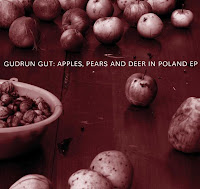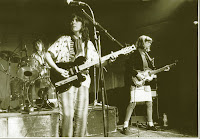
Right about now
Gudrun Gut should be on her long journey home after a two-week Antipodean trip, with a festival appearances and other gigs. Before she touches down in Berlin, though, the
Monika boss has a
stopover in Beijing where she plays on the 8th, International Women's Day. Later in the spring, it's off to the USA. So, busy, busy.
And indeed, she was so busy that it was difficult to link up for an interview while I was in Berlin earlier this year. However, before she set off last month, we spoke briefly about her plans over the next few months and about the new EP, her first foray into download-only releases.
Coming up on 19 March is the premiere of her collaboration with sound artist
AGF, which will air on
Late Junction on BBC Radio 3 in the UK. The theme sprang from a shared interest of the two, as she explained. "It's called
Baustelle, it's about a building site, because she built a house and I built a house. But she built a house in Finland and so she doesn't live here anymore. We developed four new pieces for this. And we really enjoyed that, actually, and so we're gonna do more. We want to do an album out of that and that we wanna have finished for autumn, actually. We already have 20 minutes, so it's not so much. We want to do some live shows together."
Gudrun's house is the country house she is building in Brandenburg, north of Berlin. It is one aspect of her new-found interest in nature, which extends to artwork she contributed to the
Transgression exhibit as well as her new EP, whose title is almost as long as the four songs within:
Apples, Pears & Deer In Poland touches on romanticism and nature.
I can't remember discussing fruit in an interview but Gudrun was quite enthused by her rediscovery of "these sorta like really old German normal fruits", as opposed to the foreign imports that dominate the market. "But going back and eating a good German apple and a good German pear is something really exciting, I thought. Especially if it's not treated and stuff, it tastes beautiful and it looks beautiful. And I thought that it's so different if you have it in the shop or if you just have it from the tree. They just look much more beautiful when they are not so polished."
Another track on the EP, "Harz4Schleife", finds her taking a walk through nature and balancing her response to the beauty of the surroundings with the reality of the inhabitants. "You know, in Germany we have a problem: Landflucht. People from the countryside all move to the city, so, especially around Berlin, there are like only some men. Most women left, because they're, you know, a little bit more clever (giggle) and a couple of men are still there but they're mostly unemployed, so it's really strange because it's a whole different life there, around the country. It's because all the people who are a bit clever left."
She continued, "But then, on the other hand, it has a real life quality because it's not so full as the city. It's not Beton [concrete]. It's not so much houses. It's just like real nature. So, it's like all kind of soft earth you walk on. This has a real fascination. I'm really fascinated with this. Because, you know, I'm like much more like a culture girl. I like computer games and stuff, so this virtual world always was more my world and then I discovered that this new thing (chuckles) for me was nature. It's interesting. I find it really interesting, because there's like some depths I never expected."
Foresaking the lure of native fruit, she is heading in April to Colorado for an appearance at the
Communikey festival and a week-long
residency at the Uni of Colorado Boulder campus, where Prof. Gut will speak on her life as a self-made artist. This has prompted a bit of digging into the archive to find appropriate photos and so forth. It is now 30 years since she first emerged with experimental bands Din A Testbild and
Mania D, and so there is a wealth of potential material, but as of our discussion, she had yet to finalise the speech.
But, how would the one-time scourge of "hippieverseuchten Berlin" cope with the crunchy granola goodness of Boulder? "Oh, no problem. I don't mind hippies at all." A volte face! She laughed. "That was in the '80s." Never mind. Surely, self-made artists are allowed to be contradictory.


![Reblog this post [with Zemanta]](http://img.zemanta.com/reblog_e.png?x-id=67ffa377-ae46-4a73-be3d-d970d54779f0)

![Reblog this post [with Zemanta]](http://img.zemanta.com/reblog_e.png?x-id=9a968b69-c0a9-410a-80fc-616094eb8010)

